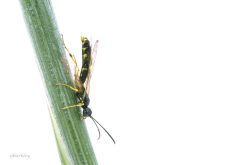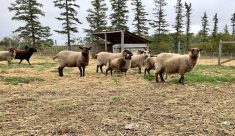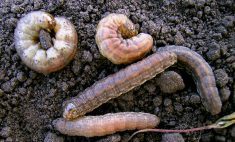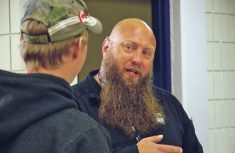Pet food is a $30-billion-a-year market in North America, and B.C. company Enterra wants to conquer it with some Alberta-raised protein — only in this case, it’s the ground larvae of black soldier flies.
The protein powder that the company makes at its facility at Balzac is palatable to pets, has good digestibility, and helps animals maintain their performance and body condition, said Bruce Jowett, the company’s director of marketing.
“The other thing, it is a novel protein — with novel proteins, allergies haven’t been developed to them,” he said. “The pet food manufacturers are looking at it and saying because it is new and novel, it’s a great opportunity to include it or develop a pet food with it in it to help with sensitivities or allergies.”
Read Also

Taking the farmers’ market online
Two Albertans, who have a cow-calf operation near McRae, had the idea to create Arvo, an online farmers’ market, after being unable to find beef from within their own community.
Insect protein is already in some European pet foods and can also be found in Wilder Harrier, a pet food developed in Montreal, and Jiminy’s, an American dog food brand.
“Their customers have told them that they want something that works that is sustainable,” said Jowett. “Sustainability is not the only reason, but it is a strong reason why you would look at an insect protein.”
The black soldier flies at Balzac are fed 130 tonnes of food waste a day, much of it unsalable produce from grocery stores or from food manufacturing.
“Rather than it going to a landfill, we’re diverting that, and we’re using the insect to upcycle those nutrients,” he said. “We take the ingredients, and we turn it into the consistency of a smoothie and that’s what we use to feed the bugs.”

Raising insects in a warehouse also uses much less land and water. And black soldier flies (a native North American species) aren’t fussy eaters.
“Their only job is to find a mate, mate and hatch eggs,” said Jowett. “The larvae are the life stage where they are capturing all their nutrients and doing all their eating. Just before they pupate, we harvest them. We allow about two per cent to continue on to the pupation stage as adults.”
The life cycle is about 35 days from adult to adult, and about 30 to 32 days from adult to fully grown larvae (also called grubs).
“At any given time, we have three billion forms of the insect in our facility,” he said.
Although the company has found a vibrant market for their insect protein, there are challenges in getting people to chow down on insect protein, Jowett conceded.
“North America would be the last area for an acceptance or interest in insects — the reason for that is that it’s not part of our culture,” he said, adding about 60 per cent of the world’s population consumes some form of insects.
But while the thought of eating something made from bugs isn’t appealing to most North Americans, the sustainability side of the business is.
“As people take a look at the opportunity to do things more sustainably, to look at the components that insects can provide in the form of nutrition, and some of the other components of what make up insect ingredients, I think people are going to take a serious look at it,” said Jowett.
Enterra also sells dried grubs (for chicken or bird feed) and extracts the oil from the larvae using a cold press, to add to pet food. The oil has also been tested as feed for piglets. Poultry and swine feed were actually the target markets at first, until company officials realized the demand for a pet food ingredient was much higher.
















